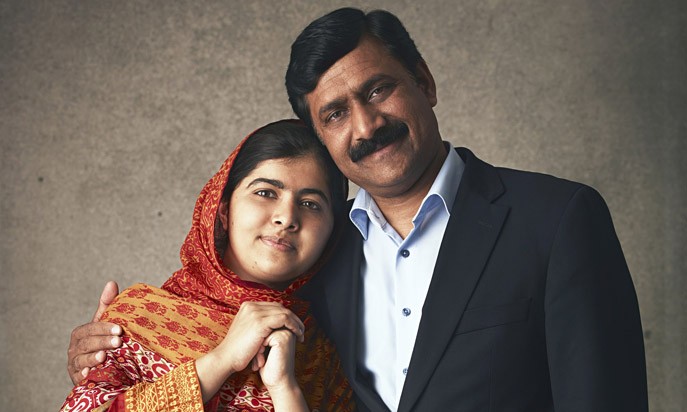
By disowning Malala, we are losing ground to religious bigotry

It began with an anti-Malala and Ziauddin Yousafzai programme aired by a private TV channel three weeks ago that induced my interest in looking into those allegations if they had any truth. In fact, we have several great Pakistanis discredited under three different labels. Whereas some were disowned as they were branded as traitors to Pakistan, others were maligned in the name of being either untrue Muslims or they were labeled as the agents of west -- read the USA.
Bacha Khan and G.M Syed, for example, were denounced as traitors to the country no matter that they would raise their voices for the rights of their constituencies. In addition to Sir Zafarullah Khan -- Pakistan’s first and perhaps most celebrated foreign minister -- Dr Abdus Salam, the first and until recently the only Pakistani to receive the prestigious Nobel Prize in 1979, remain our unsung heroes because they were Ahmadi Pakistanis. Malala Yousafzai is the latest entry. In addition to being billed as a western agent, recently a completely uncalled-for attempt was made to revile her in the name of religion.
It was my second reading of Malala’s book "I am Malala" to take stock of if what she had written really tended to anything that may be called as anti-Pakistan, anti-Islam or something of the sort. In the book, Malala, an eye witness of Taliban terror in the scenic valley of Swat, is extremely critical of militants’ unleashing of the reign of terror by misleading people in the name of religion. "Mullahs often misinterpret the Quran and Hadith when they teach them in our country as few people understand the original Arabic", Malala writes. "Fazlullah exploited this ignorance," Malala adds. She also says, "Holy Quran clearly says it is wrong to kill." Similarly, Malala does not mince words when she says, "I have problems with our Pashtunwali code. We are supposed to take revenge for wrongs done to us, but where does that end?" she asks. "There is no time limit", she answers.
Malala strongly disapproves of army’s role in politics. "My country may not be very old but unfortunately it already has a history of military coups," she informs her readers. She is no less critical of the CIA’s role in destabilising Pak-Afghan region. "My father says that in our part of the world this idea of jihad was very much encouraged by the CIA. Children in the refugee camps were even given school textbooks produced by an American university which taught basic arithmetic through fighting," states Malala.
She has rightly high regard for towering figures such as Quaid-i-Azam and Bacha Khan. "Jinnah said, Malala writes, "No struggle can ever succeed without women participating side by side with men. There are two powers in the world; one is the sword and the other is the pen. There is a third power stronger than both, that of women." On Bacha Khan, Malala says, "I am inspired by Khan Abdul Ghaffar Khan, the man who some call the Frontier Gandhi, who introduced a non-violent philosophy to our culture." Furthermore, Malala is proud of where she comes from. "I am in a country which is five hours behind my beloved homeland Pakistan and my home in the Swat Valley." Similarly, she writes, "So I was born a proud daughter of Pakistan."
What I gathered from Malala’s book I am Malala were these: Islam and Taliban are two diametrically different phenomena; dictatorship is harmful to Pakistan; religious militancy is a hangover from American-sponsored Afghan jihad; and Pakistan is her loved country. As a matter of fact, Malala’s book is a critical publication centered mainly on Malala against the backdrop of events happening in Swat especially post-9/11. The book is an indicator of a Pakistani intellectual in the making.
Of the latest episode of Malala bashing in a televised programme, it actually taps into paranoia that outside world out there is all set to harm us. In the programme, religion and jingoism were mainly used as means to give voice to misplaced fears regarding outside world.
Maligning Malala is ungraceful for a variety of reasons. First, she has been spearheading a very positive change back in Pakistan. She is the emblem of courage and beacon of hope for teeming millions of downtrodden females in the country especially among the hardcore conservative Pashtuns. Without having female in leading roles, progress is a dead end, indeed.
Second, Malala is a world acclaimed celebrity and not a politician. Being the only Pakistani to receive such a rapturous applause around the world, Malala showcases Pakistani’s positive image in the world.
Third, Malala is the emblem of anti-Taliban fight and needs only further encouragement. By disowning Malala we are losing ground to religious bigotry.
There should be a difference between freedom of speech and character assassination. The "hate speech" against Malala on a televised programme falls under the latter category. In any case, no one has the right to issue certificates of patriotism and Islam to fellow citizens. As far Malala, she is one among a few names we can rightly be proud of. Ziauddin Yousafzai, Malala’s proud father, deserves our appreciation. There would have been no Nobel Laureate Malala without the unflinching support of her father. Discrediting our national genius has done no good to us; nor will it!